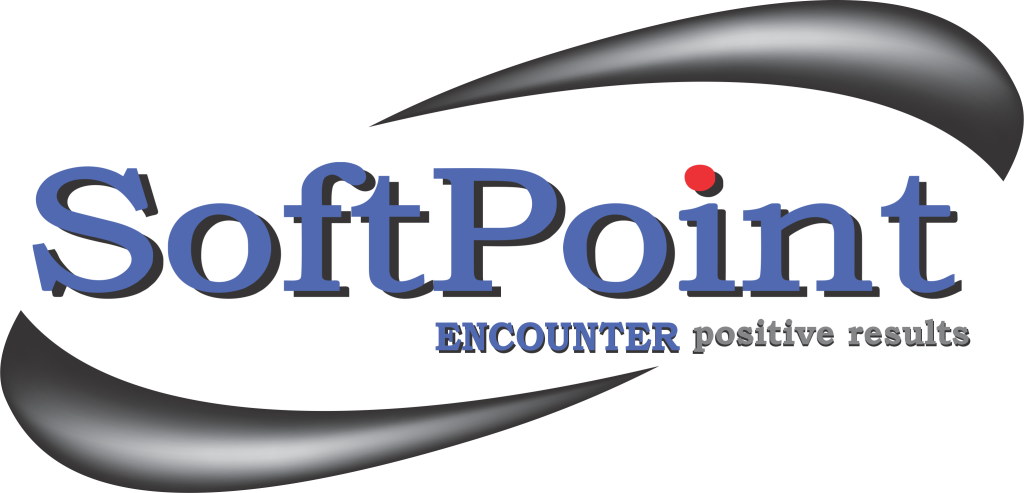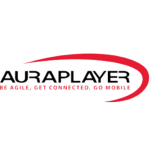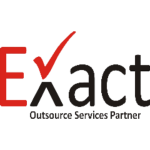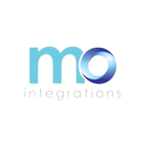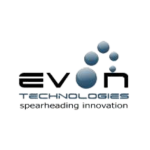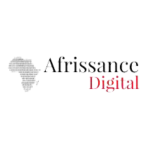Services
We provide a wide range of Services
We offer services and trainings across the Oracle product and technology platform stack. Our range of diversified Information technology and services forms the foundation of the service levels and solutions which we offer to increase their efficiency, enhance productivity and optimize cost.
Services Include:
- Oracle Cloud and E-Business Suite implementation, upgrade, and support
- Oracle Cloud Assessment and Support
- Oracle Cloud Solutions – mobile services, digital assistance, integrated cloud services – Visual Builder
- Oracle transformational technologies – using adaptive intelligence, machine learning, blockchain, IoT
- Oracle application implementations, upgrade, and training
- Enterprise architecture design, business continuity, and disaster recovery services
- Software and hardware selection/evaluation, installation, and management
- Project/change management
- Oracle Apps DBA – Managed services and support
- Post-implementation support services (functional & technical)
- Outsourcing and resourcing oracle professionals & specialists
Across the Following Stacks:
- Database
- Java
- Applications
- Business Intelligence
- Middleware
- Enterprise Management
- Industries
- Operating Systems
- Systems
- Virtualization
Methodology and Support Approach
SoftPoint believes in using methodologies and standards to ensure the quality and consistent delivery of products and services provided to its customers.
SoftPoint utilizes the methodologies and standards developed by its strategic partners, a methodology known as Oracle’s Unified Method (OUM). The OUM supports implementations of every size including projects (small to large), programs, agile implementations, and staff augmentation engagements.
OUM provides comprehensive support for On-premise and cloud solutions, with guidance to assist customers in planning their transition to the cloud, SaaS implementations, and management of operational cloud environments. OUM also supports a variety of other engagement types, including Application Implementation and Software Upgrade projects as well as a complete range of technology projects.
OUM includes four Focus Areas – Manage, Envision, Implement and Operate. OUM’s Manage focus area provides a framework in which all types of projects can be planned, estimated, controlled, and completed in a consistent manner. OUM’s Envision focus area deals with the development and maintenance of enterprise-level IT strategy, architecture, and governance. Envision also assists in the transition from enterprise-level planning and strategy activities to the identification and initiation of specific projects.
The Implement focus area provides a framework to develop and implement Oracle-based business solutions with precise development and rapid deployment. The Operate focus area spotlights how to manage and support software in production. It is aligned with the Information Technology Infrastructure (ITIL), and describes the services provided by Oracle Managed Cloud Services (OMCS), as well as other organizations involved in providing and managing services to Oracle customers.
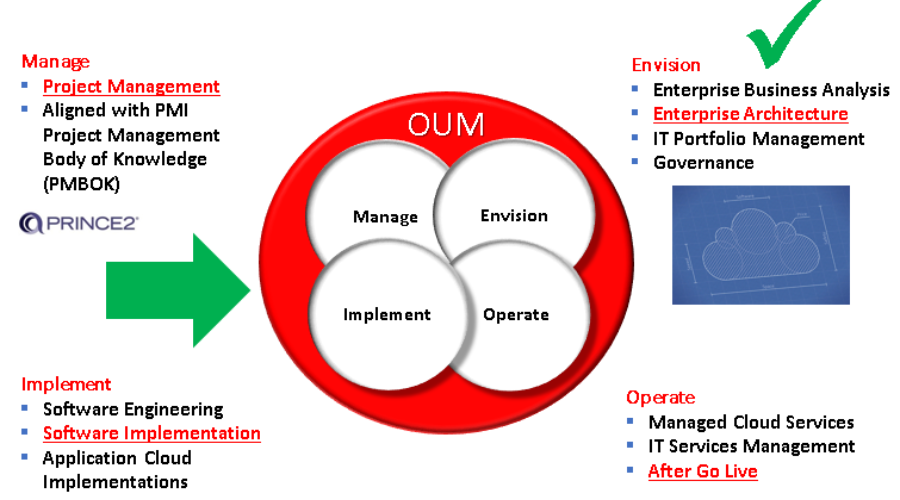
Architecture Development Method
We propose a combination of OUM with the TOGAF Architecture Development Method (ADM). The TOGAF (ADM) provides a tested and repeatable process for developing architectures. The ADM includes establishing an architecture framework, developing architecture content, transitioning, and governing the realization of architectures.
All of these activities are carried out within an iterative cycle of continuous architecture definition and realization that allows organizations to transform their enterprises in a controlled manner in response to business goals and opportunities
Phases within the ADM are as follows:
■The Preliminary Phase: describes the preparation and initiation activities required to create an Architecture Capability including customization of the TOGAF framework and definition of Architecture Principles.
■ Phase A: Architecture Vision describes the initial phase of an architecture development cycle It includes information about defining the scope of the architecture development initiative, identifying the stakeholders, creating the Architecture Vision, and obtaining approval to proceed with the architecture development.
■ Phase B: Business Architecture describes the development of a Business Architecture to support the agreed Architecture Vision
■ Phase C: Information Systems Architectures describes the development of Information Systems Architectures to support the agreed Architecture Vision.
■ Phase D: Technology Architecture describes the development of the Technology Architecture to support the agreed Architecture Vision.
■ Phase E: Opportunities & Solutions conducts initial implementation planning and the identification of delivery vehicles for the architecture defined in the previous phases.
■ Phase F: Migration Planning addresses how to move from the Baseline to the Target Architectures by finalizing a detailed Implementation and Migration Plan.
■ Phase G: Implementation Governance provides architectural oversight of the implementation.
■ Phase H: Architecture Change Management establishes procedures for managing change to the new architecture.
■ Requirements Management examines the process of managing architecture requirements throughout the ADM.
Our Critical Success Factor
Strategic Critical Success Factors
- Top management commitment and support
- Visioning and planning
- Build a business case
- Project Champion
- Implementation strategy and timeframe
- Vanilla ERP
- Project management
- Change Management
- Managing cultural change
Tactical Critical Success Factors
- Balanced team
- Project Team: The best and the brightest
- Communication plan
- Empowered decision-makers
- Team morale and motivation
- Project cost planning and management
- Business Process
- Reengineering and software configuration
- Legacy system consideration
- IT Infrastructure
- Client Consultation
- Selection of ERP
- Consultant selection and relationship
- Training and job redesign
- Troubleshooting/crises management
- Data conversion and integrity
- System testing
- Post-implementation evaluation
Mode of Communication
Support
In order to officially report defects, SoftPoint will provide Help Desk with an email address and mobile phone number to log request.
Service Desk and Support Process
In general, SoftPoint Help Desk will be the focal point of logging requests with our client resource unless otherwise defined; The Help Desk is reachable via our website, email and via mobile phone. The Help Desk will assign requests logged to the responsible consultant internally. It is the responsibility of the consultant to contact our client resource to get more details or technically elaborate the problem/defect.
It is possible that application owner may assign the incidents to different persons but this will be addressed on a case-by-case basis. The Help Desk gets notified when a request/defect/problem is resolved in order to confirm with the users. The Help Desk will be the focal point to monitor the consultant performance and identify the incidents when the consultant does not meet the SLA’s.
Escalation Scheme:
SoftPoint proposes that an escalation matrix should be agreed upon once the contract is awarded, in order to manage and organize communicating failures from the consultant to meet SLA.
This scheme identifies the parties concerned with the different levels of escalation from consultant’s end. Our client is expected to propose its own parties taking into consideration the persons at each escalation level and their peers.
Organization and Staffing
SoftPoint recognizes that the quality of its resident consultants is the most important factor that enables SoftPoint to provide high-quality Oracle solutions for its customers. Therefore, SoftPoint has adopted a policy of obtaining and maintaining the highest caliber consultants.
Through aggressive selection criteria and a strategy of continuous training, SoftPoint has been able to establish a strong base of resident consultants. Each consultant has a combination of application technology expertise and general business consultancy experience. While our consultants are specialized in specific focus areas (specific sets of modules in an application or a specific industry solution), they also possess a general knowledge of other modules and solutions.
This balanced combination of experience, expertise, general knowledge, and business background enables our consultants to consider solutions from an overall business point of view and provide comprehensive and integrated solutions that meet today’s challenges and capitalize on tomorrow’s opportunities.
SoftPoint also recognizes that project management is a key skill to ensure the successful implementation of projects. SoftPoint has a group of its Principal, Senior, and Junior Consultants who have strong experience in project management and are continuously trained in latest developments in project management skills and techniques.
